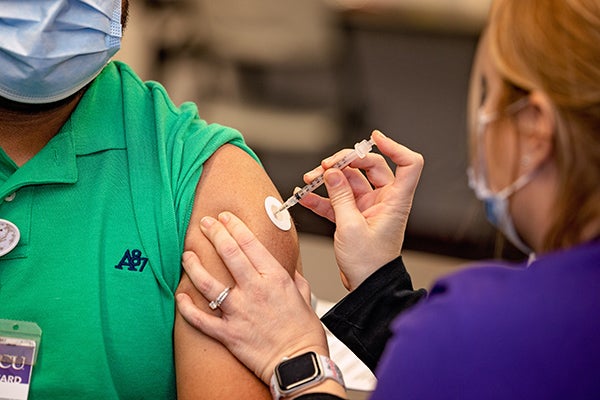Study finds lack of diversity in health stock photo libraries
A class assignment during his first year of college opened the door for East Carolina University Honors College alumnus Zach Chichester to publish a study highlighting how the lack of diversity in stock photo libraries impacts the health education field.
The study found health-related images in stock photography libraries primarily consisted of light-skinned people within a small age range and did not accurately represent the diverse populations that health education materials address.

A study published by an East Carolina University alumnus highlights the lack of diversity in stock photo libraries and its impacts on the health education field. (ECU file photo)
“It’s important for creators of health education media to have diverse stock photography to make media that represents the populations that they’re targeting,” said Chichester, a May 2022 graduate with a bachelor’s degree in biology.
The study was a collaboration between ECU and North Carolina State University and originally started when NCSU faculty had difficulties finding a photo of a pregnant Latina woman for a communication piece.
“If health educators and communicators cannot create relevant products because they cannot access topical images that look like their audiences, then they are facing a measurable barrier to connecting and conveying potentially lifesaving information,” said Michelle Jewell, chief science communicator in the NCSU Department of Applied Ecology.
Chichester became involved with the research as part of his signature honors project, the final project that all Honors College students complete in either research or creative activity. His choice of faculty mentor was an easy decision — Chichester had already met him three years prior through the honors first-year colloquia class.
In the class, students are given a “wicked problem” — a social or cultural issue that is difficult or impossible to solve —and create local solutions to help alleviate the problem. During the research phase, students are required to interview experts in that field, which is how Chichester was first introduced to Joseph Lee, a professor in the Department of Health Education and Promotion.
Lee’s experience with quantitative content analysis was key to the study. The research team took the first 25 images from five libraries commonly used by health education media and coded for variables such as skin tone, age, perceived gender presentation and more within the photo search fields of healthy eating, exercising, quitting smoking, vaccination and pregnancy. Chichester was a vital part of the coding and analyzing process.
“Zach has been a great partner in taking a smart research idea and making it happen in a way that can inform business decisions by stock photo libraries and how we develop public health communication materials,” Lee said. “We’re interested to see how much more expensive images are if they portray racial, ethnic or socioeconomic diversity. And, importantly, I’d like to know if the stock photo libraries make changes based on this work or what’s keeping them from doing so.”
Participating in undergraduate research experiences and building networks on campus and beyond is a goal of the Honors College’s curriculum.
“We are very excited to see Zach’s work published recently since outcomes like this are what we strived for when we created the Honors College curriculum at ECU,” said Todd Fraley, Honors College interim dean. “This experience helped Zach build a strong professional network and prepared him for the next steps on his personal and professional path. We are thankful for faculty like Dr. Lee who support and encourage our students, and are proud to have Zach as part of our community.”
Currently, Chichester is keeping up with research while also getting clinical hours. While he’s still thinking about applying to medical school, his work with Lee has him considering another career path.
“I’ve been going back and forth between the idea of applying to medical school or going into a public health role or research role,” he said. “Right now, I’m looking at research jobs after presenting at RTI International and learning more about what they do there.”